Select Works of John Stuart Mill (10 vols.)
Digital Logos Edition
This product has been transferred from Community Pricing to Pre-Pub. The actual funding level may be lower than it appears, which could delay production. The amount of funding still needed will be evaluated and updated soon.
Overview
One of the most influential philosophers of the nineteenth century, John Stuart Mill wrote extensively about politics, economics, and society. He argued that it was humanity’s duty to consistently move forward, cultivating knowledge, individual freedom, and human well-being.
Featuring ten of John Stuart Mill’s most influential works, this collection offers insight into the philosopher’s thought on everything from forms of government, to the pursuit of happiness, to the cultivation of human rights. Explore the great political economist’s perspectives on personal freedom, power, and harm in On Liberty. Understand his views on virtue and happiness with Utilitarianism. Examine his thoughts on the production and distribution of wealth in Principles of Political Economy. For over 150 years, John Stuart Mill’s works have profoundly influenced discussions on the relationship between the government and the people, authority and freedom, as well as societal rights and responsibilities. These keystone texts of nineteenth-century liberalism are crucial for understanding the Western world today.
With Logos, these volumes are enhanced by cutting-edge research tools. Important terms link to dictionaries, encyclopedias, and a wealth of other resources in your digital library. Powerful topical searches help you find exactly what you’re looking for. Tablet and mobile apps let you take the discussion with you. With Logos, the most efficient and comprehensive research tools are in one place, so you get the most out of your study.
Dive into more works on political philosophy with CUA Studies in Ethics and Moral Philosophy (7 vols.).
- Offers John Stuart Mill’s perspectives on government, liberty, and happiness
- Includes John Stuart Mill’s autobiography
- Presents a window into nineteenth-century liberalism
No one has ever been so right about so many things so much of the time as John Stuart Mill.
—Adam Gopnik, staff writer, The New Yorker
- Title: Select Works of John Stuart Mill
- Author: John Stuart Mill
- Volumes: 10
- Pages: 2,577
- Resource Type: Monographs
- Topic: Modern Philosophy
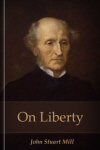
On Liberty has never gone out of print. In his best-known work, Mill discusses the tension between authority and liberty, government and individual freedom. To Mill, in order for both people and society to progress, liberty is essential. He argues that a democratic government which represents the interests of the people is best suited to this task.
Contents
- Introductory
- Of the Liberty of Thought and Discussion
- Of Individuality, as One of the Elements of Well-being
- Of the Limits to the Authority of Society Over the Individual
- Applications
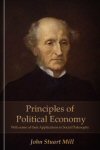
In Principles of Political Economy, Mill examines society’s economic foundations: production, the distribution of goods, and exchange—as well as their relationship with social progress. He also examines the role government plays in these economic processes.
Contents
- Production
- Distribution
- Exchange
- Influence of the Progress of Society on Production and Distribution
- On the Influence of Government
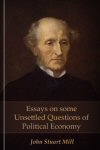
In this collection of five essays, John Stuart Mill further discusses how political economy informs society of the laws which regulate the production, distribution, and consumption of wealth.
Contents
- Of the Laws of Interchange between Nations; and the Distribution of the Gains of Commerce among the Countries of the Commercial World
- Of the Influence of Consumption upon Production
- On the Words Productive and Unproductive
- On Profits, and Interest
- On the Definition of Political Economy; and on the Method of Investigation Proper to It

Utilitarianism, as explained by John Stuart Mill, is a theory based upon the idea that “actions are right in proportion as they tend to promote happiness, wrong as they tend to produce the reverse of happiness.” In this text, Mill explains the value of utilitarianism as a moral theory and addresses common misconceptions about the concept. Mill also argues that virtuous living is a key part of pleasure in life and the pursuit of happiness.
Contents
- General Remarks
- What Utilitarianism Is
- Of the Ultimate Sanction of the Principle of Utility
- Of What Sort of Proof the Principle of Utility is Susceptible
- Of the Connexion Between Justice and Utility
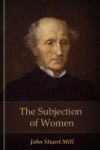
While serving in British Parliament, one of John Stuart Mill’s primary commitments was women’s suffrage. In The Subjection of Women, Mill argues for gender equality, stating:
“That the principle which regulates the existing social relations between the two sexes—the legal subordination of one sex to the other—is wrong in itself, and now one of the chief hindrances to human improvement; and that it ought to be replaced by a principle of perfect equality, admitting no power or privilege on the one side, nor disability on the other.”
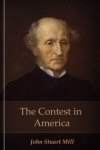
In this essay, John Stuart Mill examines the American Civil War, arguing that it will be a long fight, but worthwhile, as it will lead to the end of slavery in the United States. Mill compellingly argues for the necessity of continually fighting for the freedom and dignity of all humankind, stating "as long as justice and injustice have not terminated their ever renewing fight for ascendancy in the affairs of mankind, human beings must be willing, when need is, to do battle for the one against the other.”
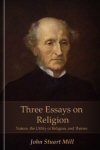
Published posthumously, Three Essays on Religion: Nature, the Utility of Religion, and Theism criticizes traditional religious views and advocates for an alternative form of religion. John Stuart Mill refers to this alternative as the “Religion of Humanity” and argues that an idealized state of humanity should be held in reverence and that society should continually strive to make this perfect society a reality.
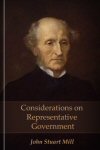
In this text, John Stuart Mill discusses different forms of government and the nature of democracy. Mill argues that a representative government is the best form of government, stating that:
“. . . it is evident that the only government which can fully satisfy all the exigencies of the social state is one in which the whole people participate . . . But since all can not, in a community exceeding a single small town, participate personally in any but some minor portions of the public business, it follows that the ideal type of a perfect government must be representative.”
Contents
- To What Extent Forms of Government are a Matter of Choice
- The Criterion of a Good Form of Government
- That the Ideally Best Form of Government is Representative Government
- Under What Social Conditions Representative Government is Inapplicable
- Of the Proper Functions of Representative Bodies
- Of the Infirmities and Dangers to Which Representative Government is Liable
- Of True and False Democracy; Representation of All, and Representation of the Majority Only
- Of the Extension of the Suffrage
- Should there be Two Stages of Election?
- Of the Mode of Voting
- Of the Duration of Parliaments
- Ought Pledges to be Required from Members of Parliament?
- Of a Second Chamber
- Of the Executive in a Representative Government
- Of Local Representative Bodies
- Of Nationality as Connected with Representative Government
- Of Federal Representative Governments
- Of the Government of Dependencies by a Free State
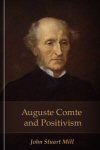
In this work, John Stuart Mill discusses French philosopher Auguste Comte’s views regarding positivism (the belief that all authentic knowledge can be verified). Mill analyzes Comte’s earlier works on positivism as well as the application of positivism to religion and ethics.

In his autobiography, John Stuart Mill recounts his remarkable life. He includes compelling anecdotes on subjects such as his precocious childhood, nervous breakdown in his early 20s, friendship with the philosopher Auguste Comte, as well as his political career.
Contents
- Childhood and Early Education
- Moral Influences in Early Youth. My Father’s Character and Opinions.
- Last Stage of Education and First of Self-Education
- Youthful Propagandism. The Westminster Review.
- A Crisis in My Mental History. One Stage Onward.
- Commencement of the Most Valuable Friendship of My Life. My Father’s Death. Writings and Other Proceedings up to 1840.
- General View of the Remainder of My Life
John Stuart Mill was an English philosopher and politician. From 1823 to 1858, he served as an administrator in the East Indian Company. From 1865 to 1868, he was a member of parliament where he argued in favor of equality between men and women. His numerous works include Principles of Political Economy, On Liberty, Utilitarianism, The Subjection of Women, and his Autobiography.
Reviews
1 rating

Ian Carmichael
5/9/2015
Mill needs no praise from me. But, for anyone who hasn't actually read him, he is an eminently readable author - even at this distance in time.